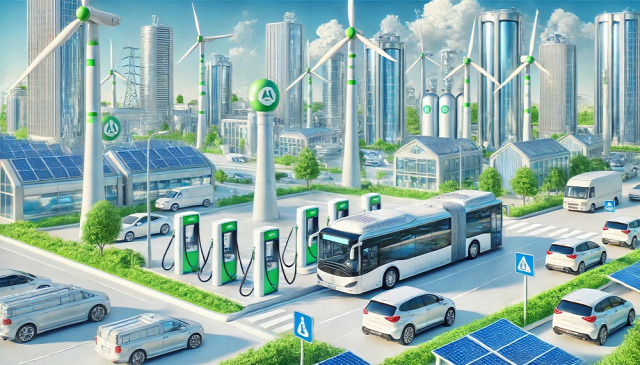
The Europe Hydrogen Fuel Cell Market is witnessing significant growth, driven by the increasing focus on clean energy solutions, stringent environmental regulations, and advancements in hydrogen technology. Hydrogen fuel cells have emerged as a promising alternative to conventional fossil fuels, offering zero-emission energy solutions for transportation, industrial applications, and power generation.
According to BISResearch, the Europe hydrogen fuel cell market was valued at $438.5 million in 2023 and is expected to reach $3,770.4 million by 2033, with a CAGR of 24.01% from 2023 to 2033.
The European hydrogen fuel cell market is experiencing significant growth, driven by the region’s commitment to achieving carbon neutrality and curbing greenhouse gas emissions. Europe has emerged as a frontrunner in the hydrogen economy, making substantial investments in infrastructure, research, and development. The European Union’s Green Deal and Hydrogen Strategy serve as key initiatives promoting the adoption of hydrogen technologies across various sectors, including transportation, industry, and energy storage.
What is the future of hydrogen fuel cells?
The future of hydrogen fuel cells looks promising, with advances in technology likely to reduce costs and improve efficiency. As infrastructure expands and renewable hydrogen production scales up, fuel cells are expected to play a key role in sustainable transportation, energy storage, and industrial applications.
Europe Hydrogen Fuel Cell Market Drivers
-
Government Policies and Investments: European governments are actively promoting hydrogen fuel cell technology through funding programs, subsidies, and regulatory support. The European Green Deal and the EU Hydrogen Strategy aim to accelerate the adoption of hydrogen-powered solutions across industries.
-
Decarbonization Efforts: With the commitment to achieving net-zero carbon emissions by 2050, European nations are investing in hydrogen infrastructure, production facilities, and fuel cell research to replace fossil fuels with sustainable alternatives.
-
Growing Adoption in Transportation: The demand for hydrogen fuel cell vehicles (HFCVs) is rising, particularly in buses, trucks, and trains. Automakers such as Toyota, Hyundai, and Daimler are expanding their fuel cell vehicle offerings, while countries like Germany, France, and the UK are deploying hydrogen-powered public transport fleets.
-
Expansion of Green Hydrogen Production: Europe is leading in the development of green hydrogen, produced via electrolysis using renewable energy. Investments in electrolyzer technology and large-scale hydrogen projects are expected to drive market growth.
-
Industrial Applications and Energy Storage: Hydrogen fuel cells are being integrated into industrial processes, backup power systems, and energy storage solutions, further expanding the market potential.
Request A Detailed Sample on the Europe Hydrogen Fuel Cell Market!
Public-Private Partnerships Driving Market Growth
Collaborations between the public and private sectors are significantly advancing the market by focusing on increasing hydrogen production, enhancing fuel cell technology, and reducing costs. Leading automotive and energy companies are actively engaged in developing and commercializing hydrogen fuel cell solutions. As the European hydrogen fuel cell market continues to grow, it is set to play a crucial role in the continent’s shift towards a more sustainable and resilient energy future.
Future Prospects
Despite these challenges, the Europe Hydrogen Fuel Cell Market is poised for growth, with increasing investments, technological advancements, and supportive policies driving adoption across sectors. As green hydrogen production becomes more cost-effective, fuel cell applications will expand, solidifying Europe's leadership in the global hydrogen economy.
Some prominent names established in the market are:
-
Ceres
-
AFC Energy
-
Nedstack Fuel Cell Technology
Conclusion
The Europe Hydrogen Fuel Cell Market is a key player in the transition toward a sustainable energy future. With strong policy support, growing demand for clean transportation, and advancements in hydrogen infrastructure, the market is expected to witness robust growth in the coming years. Industry stakeholders must focus on scaling production, reducing costs, and expanding infrastructure to unlock the full potential of hydrogen fuel cells in Europe.

